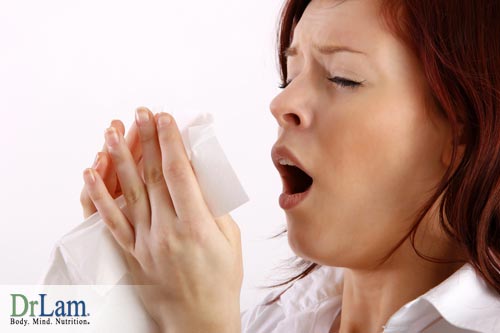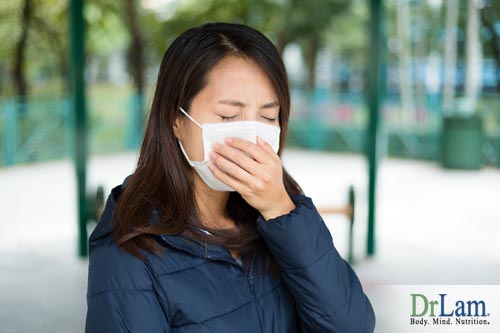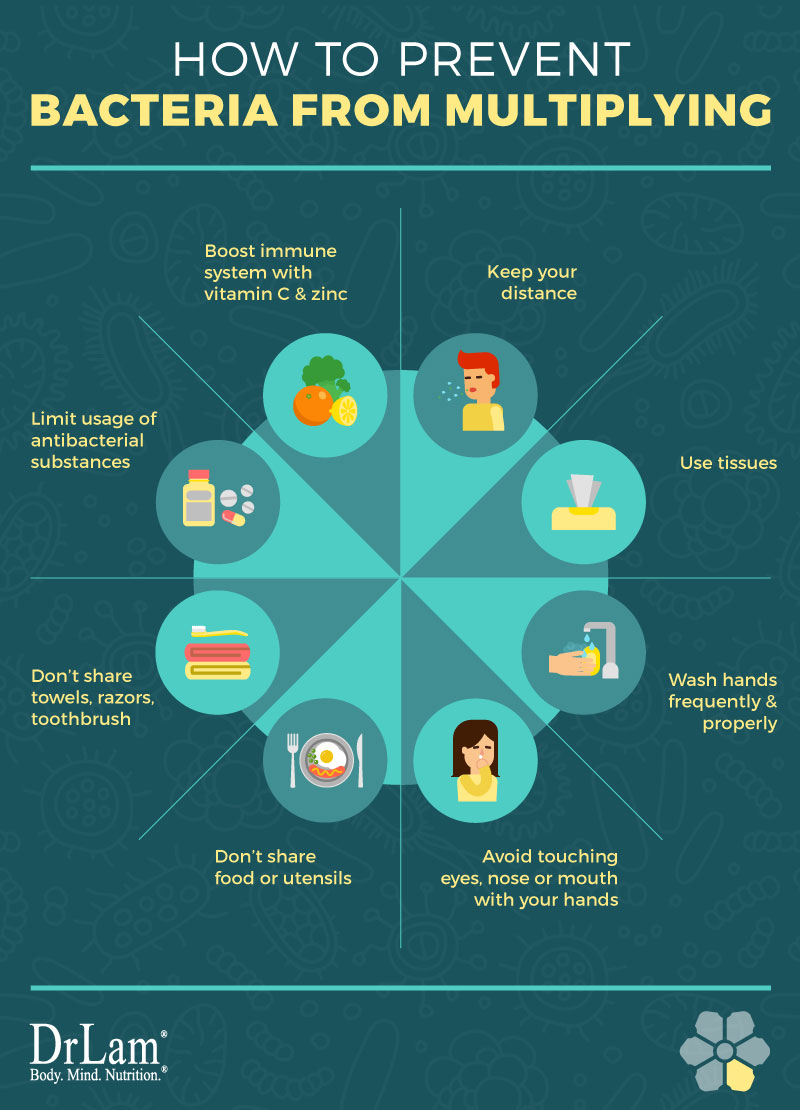 An uncovered sneeze on a crowded subway train can be a cause for concern. Nearby passengers are at risk for exposure to germs, possibly inhaling pathogens. This begins the process of bacteria multiplying in the body. While your first reaction might be to move far away from the culprit, chances are there are many more infectious individuals on that same train car already teeming with malicious pathogens.
An uncovered sneeze on a crowded subway train can be a cause for concern. Nearby passengers are at risk for exposure to germs, possibly inhaling pathogens. This begins the process of bacteria multiplying in the body. While your first reaction might be to move far away from the culprit, chances are there are many more infectious individuals on that same train car already teeming with malicious pathogens.
Places like public transit and the workplace tend to be cesspools for bacteria multiplying. What one really needs is a strong immune system and some strategies for keeping harmful germs at bay.
Maintaining a healthy immune system is especially important for those with compromised adrenal function. Adrenal Fatigue Syndrome (AFS) is a result of excessive stress on the body, and is connected to an imbalance in the NeuroEndoMetabolic (NEM) Stress Response system. The NEM is how the body works together to help protect against stress and maintain normal function. In today’s busy world, stress has become the norm, and unfriendly pathogens have an open door to wreak havoc on our bodies and cause infection.
Chronic or severe infection, which produces an inflammatory response in the body, can sometimes be the root cause of AFS. They can also aggravate AFS. Such infections, often overlooked, can occur sub-clinically with no obvious signs or symptoms.
For example, helicobacter pylori is a spiral-shaped bacteria that affects the digestive tract. While not everyone experiences symptoms, H. pylori can sometimes negatively affect your immune response and cause stomach problems like gastritis or ulcers. Such bacteria multiplying can ultimately affect your body’s NEM stress response and and your adrenals. Oftentimes these pathogens exist in the stealth mode. They are ever present in the body but not detected by routine laboratory testing. Sufferers are given a clean bill of health but suffer internally from these assaults 24/7. Over time, the body’s immune and stress response is overwhelmed, leading to fatigue, anxiety, loss of libido, brain fog, anxiety, etc.
Furthermore, according to The National Academy of Sciences, “Sometimes bacteria multiply so rapidly they crowd out host tissues and disrupt normal function. Sometimes they kill cells and tissues outright. Sometimes they make toxins that can paralyze, destroy cells’ metabolic machinery, or precipitate a massive immune reaction that is itself toxic.” All of these consequences disrupt the NEM stress response function.
While there are many effective ways to prevent such dangerous bacteria from multiplying out of control, infections are stressful on the body because they secrete toxins that weaken the adrenal glands. Maintaining an optimal NEM stress response function will be vital for successful recovery from AFS.
The following are a few measures and precautions to avoid and mitigate exposure to threatening pathogens, and to ultimately maintain a strong immune system and healthy bodily functions.
 That never ending dilemma: you’re feeling particularly crappy, but don’t want to stay home from work in fear of missing out on a much-needed paycheck. However, when you are ill, to prevent bacteria multiplying you should self-quarantine. When someone else is sick, try to stay as far away as possible. Unless you are willing to sport a facemask, it is best to stay home and rest up. You risk infecting the entire office and anyone who crosses your path.
That never ending dilemma: you’re feeling particularly crappy, but don’t want to stay home from work in fear of missing out on a much-needed paycheck. However, when you are ill, to prevent bacteria multiplying you should self-quarantine. When someone else is sick, try to stay as far away as possible. Unless you are willing to sport a facemask, it is best to stay home and rest up. You risk infecting the entire office and anyone who crosses your path.
When someone sneezes, there’s an unfortunate possibility of others being sprayed in the process. But even if there is no unwanted shower, the sneeze produces an invisible gas cloud floating through the air, with droplets too small to be seen by the human eye. Using high-speed imaging, Researchers at MIT discovered that when a person coughs or sneezes, there is a ‘multiphase turbulent buoyant cloud’ expelled.
Not only is this gas cloud invisible, but it means infectious particles are airborne and travel further than originally thought, which is bad news for ventilation systems everywhere. Such clouds contain tiny liquid droplets that mix with ambient air and circulate before eventually falling or evaporating into solid residues. Pathogens can survive for hours, even days on surfaces. Whichever way they enter the human body, viruses, bacteria, and microbes will begin to multiply, and this is how we become infected.

Should you be without a tissue, be considerate – sneeze or cough into the crook of your arm. Common scenario: a lady sitting on the bus sneezes into the palm of her hand to avoid expelling a buoyant cloud upon her fellow commuters. While she may think she’s being courteous, she then proceeds to grasp the handrails and other defenseless surfaces. In reality she is promoting the spread of germs and multiplication of bacteria. Had she instead sneezed into her elbow, covering both her nose and mouth, her bacterial footprint might have been significantly less. Which brings us to our next point.
When your hands are unclean, do your best to avoid touching your eyes, nose, or mouth. Indirect contact is one of the easiest ways to contract an infection. If the lady on the bus is ill and touches the handrail, and someone else comes along, grasping that same handrail, then proceeds to touch their own eyes, nose, or mouth, they risk transferring bacteria into their body where it will multiply.
How then, can you stop the harmful effects of these microbes?
Wash your hands properly to prevent bacteria multiplying. While hand washing is something that you should practice regularly, particularly before eating and after using the bathroom, washing your hands is crucial when you or people around you are ill. You should take care to wash your hands immediately after blowing your nose, coughing, sneezing, or touching used tissues (which should be promptly discarded).
Wash your hands with soap and warm water for at least 20 seconds, ensuring that you scrub not only hands, but in between fingers, under fingernails, and along wrists and forearms to the elbow as well. It is recommended that you use a disposable towel, as fabric tends to harbour bacteria. Turn off the faucet with your elbow or the disposable towel to minimize possible spread of germs and bacteria multiplying.
 Avoid sharing with others, especially if one of you isn’t feeling well. While most people tend to indulge in tasting and sharing friends’ and family’s food and drink, try to avoid it as much as possible, as you never know when someone might be coming down with something. Bacteria lurks on things like utensils, glasses, plates, and straws. Children are often eager to sample whatever mommy or daddy is eating or drinking, but be wary of them grabbing for your cup and catching your cold.
Avoid sharing with others, especially if one of you isn’t feeling well. While most people tend to indulge in tasting and sharing friends’ and family’s food and drink, try to avoid it as much as possible, as you never know when someone might be coming down with something. Bacteria lurks on things like utensils, glasses, plates, and straws. Children are often eager to sample whatever mommy or daddy is eating or drinking, but be wary of them grabbing for your cup and catching your cold.
Never share things like bath towels, razors, or toothbrushes. Such items love to host bacteria and pathogens. Helpful tip: replace your toothbrush upon recovering from an illness to prevent any sort of relapse.
When you’re feeling under the weather, it’s imperative that you avoid any sort of physical contact with others– avoid handshakes, hugs, kissing, and touching in general, as this will merely spread around the bacteria multiplying.
General cleanliness, and food hygiene in particular, is of utmost importance. It is absolutely critical that you wash your hands before dealing with food, and after dealing with raw meats and vegetables. Malicious bacteria like salmonella and E. coli are common on these foods. These bacteria can be killed via cooking and evaded with proper food storage and preparation. Regular and thorough cleaning of all surfaces in your household will help to stop bacteria multiplying.
However, be wary of antibacterial products when cleaning, because they there is increasing evidence that they do more harm than good.
Antibacterial products are everywhere these days, including wipes, hand sanitizers, dish and hand soaps, even mattresses. But over forty years of research has provided no evidence that antibacterial products are any more effective than traditional soap and water.
Chemicals used in various antiseptics can actually makes AFS worse. They can overload a body with an already high level of metabolic by-products because it is unable to clear them on a timely basis when weak. If you have chemical sensitivities in advanced AFS, natural soaps using essential oils and herbs may be a safer option.
In fact, more studies are showing that regular use of antibacterials might actually weaken your immune system. They not only eliminate harmful bacteria, but the friendly bacteria as well, which are important to keeping the troublesome bacteria from multiplying. A certain amount of exposure to bacteria is also necessary for proper immune system development and function.
There is also concern that triclosan, the main ingredient in antibacterial products, could disrupt the body’s thyroid function by acting as an endocrine disruptor. Studies with rats and other animals have shown that triclosan negatively affects thyroid regulation, and although not yet proven in human studies, such findings are disturbing in regard to what long-term triclosan product usage might cause in humans. If you’re recovering from AFS, your thyroid function is already unbalanced, so you might want to reconsider that antibacterial soap.
 You can help to boost your immune system with supplements and herbs. For example, vitamin C aids in the production of white blood cells, stimulating interferon production that can help your body to fight foreign bodies like viruses and bacteria. Take 1000 – 3000 mg per day to strengthen your immune system. Zinc is also excellent for immunity; it helps by producing antibodies and fighting dangerous pathogens in the body. Eating foods rich in zinc such as oysters or pumpkin seeds, or taking a supplement of 25 – 50 mg daily, can help fight off bacteria.
You can help to boost your immune system with supplements and herbs. For example, vitamin C aids in the production of white blood cells, stimulating interferon production that can help your body to fight foreign bodies like viruses and bacteria. Take 1000 – 3000 mg per day to strengthen your immune system. Zinc is also excellent for immunity; it helps by producing antibodies and fighting dangerous pathogens in the body. Eating foods rich in zinc such as oysters or pumpkin seeds, or taking a supplement of 25 – 50 mg daily, can help fight off bacteria.
Eating a healthy diet, getting lots of exercise and good quality sleep are not only the foundations of a healthy life, but fundamental in recovering from AFS and maintaining a strong immune system. It is imperative that those seeking to keep germs at bay, and especially those with AFS, take special care in nurturing their body as much as possible to prevent infection and stop dangerous bacteria multiplying.
© Copyright 2016 Michael Lam, M.D. All Rights Reserved.

